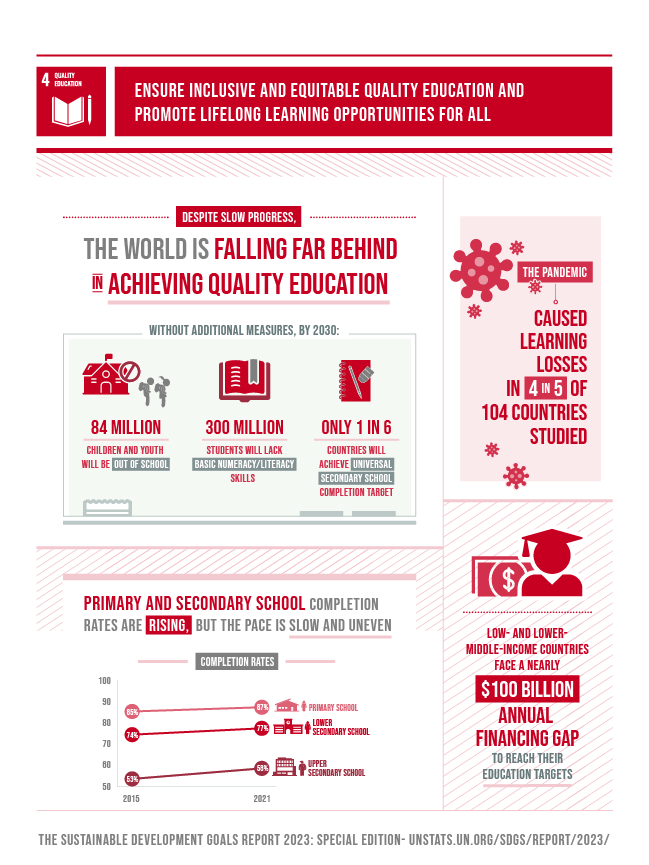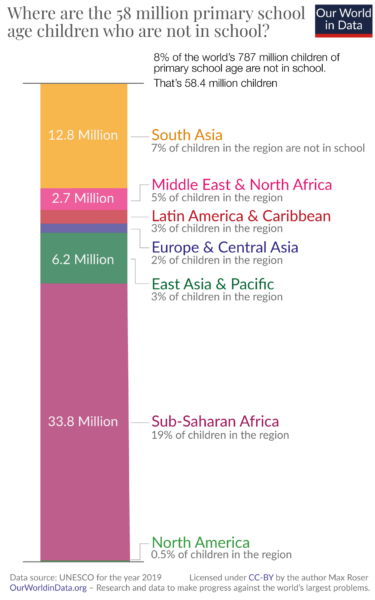Student submission by Han wen Lin
By 2030, the United Nations established the Sustainable Development Goals (SDGs), which serve as a road map for a sustainable future. SDG 4 aspires to provide all people with inclusive and equitable quality education, as well as to promote lifelong learning. Despite progress, millions of people still lack access to a good education, perpetuating cycles of poverty and inequality. Imagine a world in which education is not a privilege, but rather a fundamental right available to all, regardless of background or location. UNESCO sheds light on the pivotal role of education in achieving all SDGs. It underscores the interconnectedness of education with sustainable development, emphasising that education serves as the foundation for progress across all sectors [1]. From eradicating poverty to promoting gender equality, education is the catalyst for positive change.
Increasing/advancing Technology
One of the solutions lies in the power of technology. With the rapid advancements in digital learning tools and platforms, we have an unprecedented opportunity to democratise education. By harnessing the internet and mobile devices, we can bring quality educational content directly to learners, transcending geographical barriers [2].
Picture a scenario where a child in a remote village has access to the same educational resources as a student in a busy city metropolis. Through online courses, interactive tutorials, and virtual classrooms, we can provide tailored learning experiences that cater to diverse needs and learning styles [3]. But technology alone is not enough, Figure 1 displays the trend the sustainable goals development in 2022, although the increasing and progressing slowly there are still multiple aspects where we are falling behind in achieve quality education worldwide by 2030.

Investing in the education of teachers/more involvement in communities
We can improve the standard of education delivery and promote a culture of lifelong learning by providing teachers with the training and resources they need to support digital learning. This can assist with the difficulties caused by inadequate support in schools. At the source, where parents, educators, and other stakeholders have a critical role to play in determining educational results, is where sustainable change starts. We may establish a cooperative and supportive atmosphere that promotes learning and development by encouraging collaborations. [3].

Establish more schools
Another important factor is funding more schools and more community engagement so that we can encourage continuous development for education. Half of all out-of-school children reside in conflict-affected areas. In low-income nations, public education funding is extremely limited: annual spending in a high-income country like Austria is more than 200 times more per student than in a lower-income nation like the Democratic Republic of Congo [4]. Poverty forces children to work causing them to drop out of school or never go at all.
Quality Education requires a multifaceted approach that combines technology, teacher training, and community involvement. This step forward in achieving access to education will help to make global progress towards attaining SDG 4.
References:
[1] United Nations Department of Economic and Social Affairs, “The Sustainable Development Goals Report 2022,” United Nations, 2022.
[2] Max Roser (2021) – “Access to basic education: almost 60 million children of primary school age are not in school” Published online at OurWorldInData.org. Retrieved from: ‘https://ourworldindata.org/children-not-in school’
[3] Quality education. Five principles of inclusive education – Monash Education. Available at:https://www.monash.edu/education/teachspace/articles/five-principles-of-inclusive-education.
[4] Roser, M. (2024) Access to basic education: Almost 60 million children of primary school age are not in school, Our World in Data. Available at: https://ourworldindata.org/children-not-in-school#article-citation


